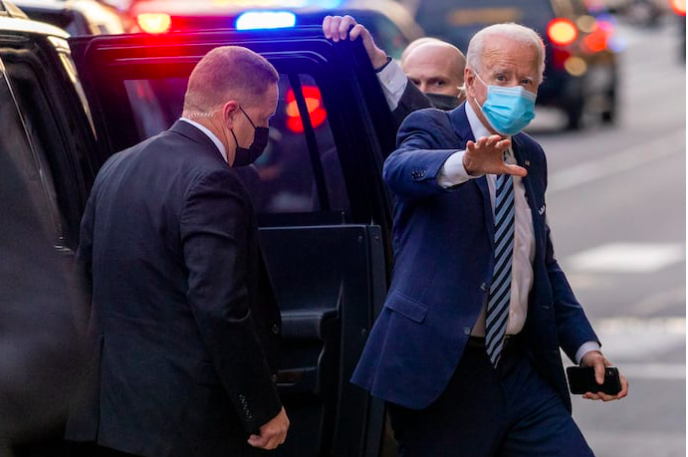The trade war might have played well politically, but it didn’t help Americans.
FROM WASHINGTON POST | DECEMBER 4, 2020
Once President Trump leaves office, some of his policy priorities may fade from view, but one that will likely persist is his aggressive posture toward China. A bill toughening audit standards for Chinese companies just passed with bipartisan support in Congress.
In an interview this week, President-elect Joe Biden said that he’s not planning to reverse tariffs on Chinese goods imported into the United States as quickly as he plans to reverse other Trump-era policies: “I’m not going to make any immediate moves, and the same applies to the tariffs,” said Biden. “I’m not going to prejudice my options.”
If there was ever a case for prejudicing options, however, lifting tariffs and breaking with Trump’s blustery, ineffective China-trade brinkmanship is it. There may be defensible political reasons to keep the Trump tariffs in place. There are no defensible economic ones.
Despite Trump’s repeated claims that “China is paying for the tariffs,” the tariffs levied on Chinese goods over the past few years were a tax on American citizens. The duties were paid by companies importing Chinese goods, not by the Chinese companies manufacturing those products, and the costs passed on to consumers. And tariffs, including an increase last year from 10 to 25 percent on Section 301 tariffs were just enough to ratchet up trade tensions with China, but not enough either to force the Chinese government to shift course on unfair trade practices and intellectual property protections, or to sufficiently push American and multinational companies to shift resources to reorient their supply chains to the United States.
To judge whether the confrontation resulted in structural changes in the overall U.S.-China economic relationship, look first at the bilateral trade between the two countries. On that score, the answer is: not much. In 2017, U.S. imports of goods from China were $505 billion. In 2018, U.S. imports went to $539 billion, but U.S. exports to China declined by more than $9 billion in the face of China’s retaliation, in the form of tariffs of its own. In 2019, after even more extensive American tariffs, imports dropped to $451 billion, and exports to China (which directly benefit American companies and farmers) dropped by more than $13 billion.
That decline in imports between 2018 and 2019 certainly can be attributed to the tariffs, though some of it reflects the decreasing costs of technology and commodities in general — electronics and furniture, for instance, are significant U.S. imports from China and both have been decreasing in cost relative to inflation.
Even with the trade-war induced decline, imports and exports in 2019 were comparable to trade in 2016, and in spite of this year’s pandemic, trade volumes with China were flat compared to 2019. The trade war has created global ripples, increasing political animosity and — with the on-again, off-again trade truces negotiated between Trump and Chinese President Xi Jinping — an uncertain business climate. But Trump’s trade war barely moved the needle in terms of the structural economic relationship, which was the supposed point of doing all this in the first place.
The other purported purpose was to trigger the reshoring of U.S. manufacturing. There is some evidence of American and multinational companies diversifying their supply chains out of China (Apple supplier Foxconn announced that starting next year, some iPad and MacBook manufacturing would be done in Vietnam). That may help other countries but doesn’t do much to boost American manufacturing.
There is scant evidence of considerable reshoring, stories of a new wave notwithstanding. One report from the left-leaning Economic Policy Institute — which, like Trump, has been broadly supportive of reducing U.S.-China trade imbalances and reinvigorating U.S. manufacturing — detailed that between “inconsistent” trade measures and tax policies that “have encouraged outsourcing,” Trump’s China policies have actually “encouraged outsourcing.” Covid-19 may ultimately induce greater domestic production of medical equipment and pharmaceuticals, but that wouldn’t result from pre-2020 trade policy.
Trump’s tariffs and China policies have done demonstrable harm to American citizens and companies, and the unilateralism of the tariffs have harmed the ability of the United States to assemble allies to pressure China with constructive trade moves and on human rights issues. Many of America’s Asian allies recently signed a trade pact with China while the U.S. was relegated largely to the sidelines. Biden’s position, that he won’t lift tariffs immediately, suggests a still-incomplete recognition of how counterproductive those and indeed much of Trump’s China tactics have been.
The proof of that isn’t just the additional costs U.S. importers (and consumers) have paid for products sourced in China; it’s the billions of dollars that the U.S. government has spent to bail out American farmers (according to one report, the Trump administration could wind up giving farmers $46 billion this year), and the decrease in Chinese spending in the United States. As the New York Times reported last year, before the pandemic, one analysis assessed that as a “worst-case scenario,” the trade war could cost the American travel industry $18 billion.
Biden’s inclination to carefully review tariff policies in light of a complicated and important U.S.-China relationship is understandable only to the degree that he wants to act deliberately. Ultimately, that approach isn’t justified, given the ineffectiveness of Trump’s approach. Tariffs haven’t made America stronger. They have hurt a variety of American businesses, succeeded in pushing some Chinese manufacturing to third countries instead of the United States and have had little success at pressuring China’s government. A new framework for U.S.-China relations should be a priority in the Biden administration’s foreign policy, and likely will be. That should start not with a review of the tariffs but with an immediate, decisive end to this failed economic policy.
